The Catholic Social Teachings
VerifiedAdded on 2023/04/21
|6
|1423
|282
AI Summary
This assignment elaborates on the three principles of Catholic Social Teachings (CST) - Common Good, Stewardship of Creation, and Subsidiarity. It explains how these principles help establish the relationship between self and community. The Common Good principle emphasizes equal opportunity and social well-being, the Stewardship of Creation principle promotes caring for the earth, and the Subsidiarity principle emphasizes inclusive decision-making. These principles highlight the importance of the relationship between self and community.
Contribute Materials
Your contribution can guide someone’s learning journey. Share your
documents today.
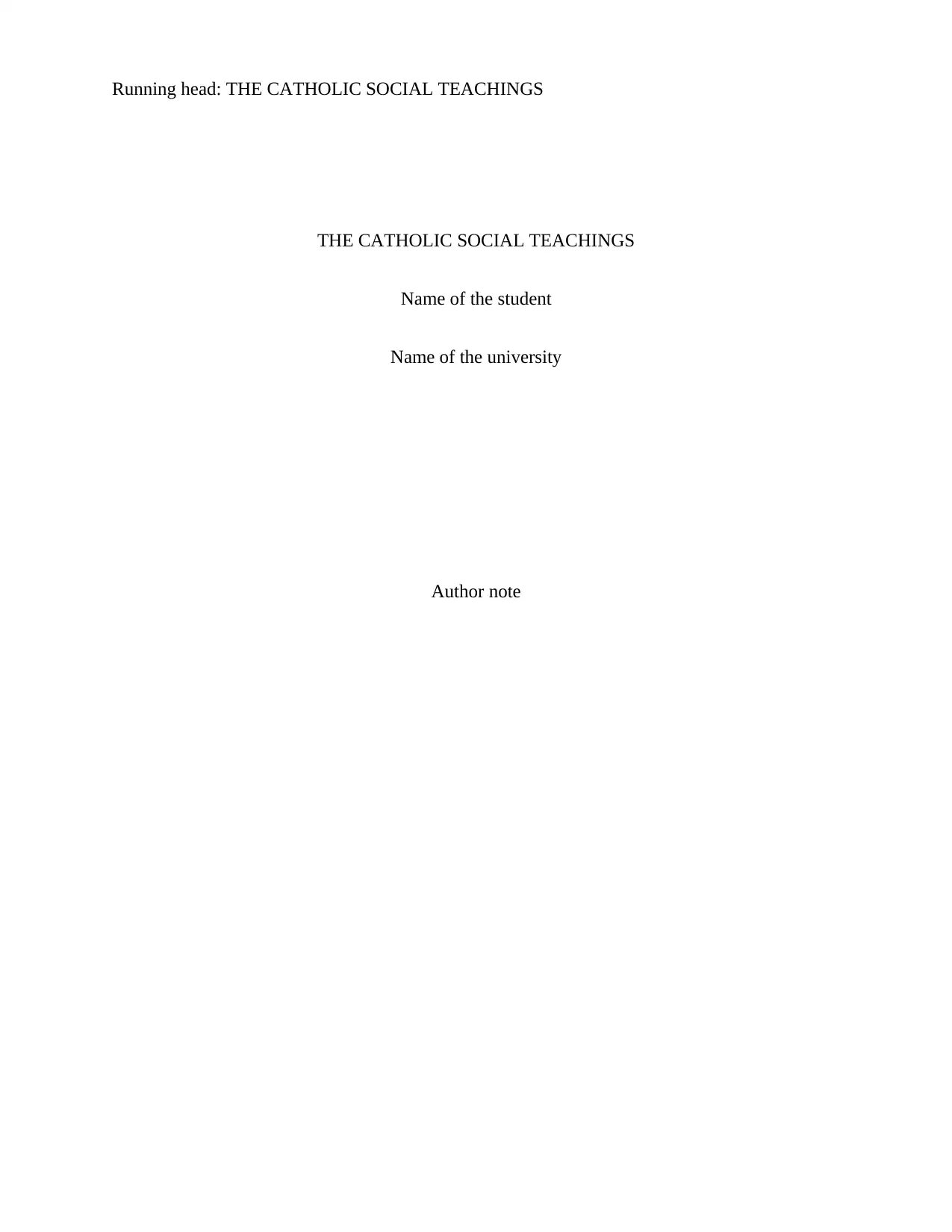
Running head: THE CATHOLIC SOCIAL TEACHINGS
THE CATHOLIC SOCIAL TEACHINGS
Name of the student
Name of the university
Author note
THE CATHOLIC SOCIAL TEACHINGS
Name of the student
Name of the university
Author note
Secure Best Marks with AI Grader
Need help grading? Try our AI Grader for instant feedback on your assignments.
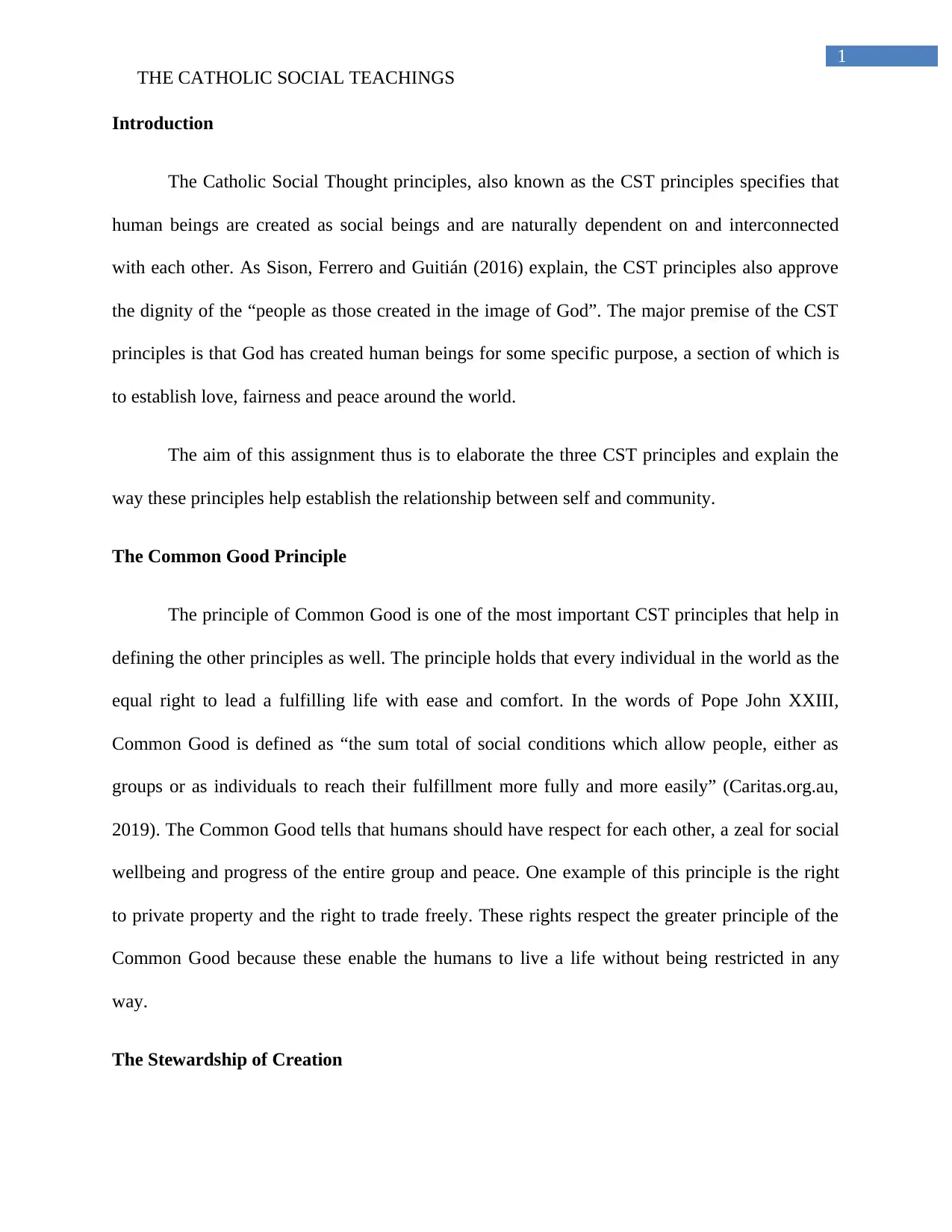
1
THE CATHOLIC SOCIAL TEACHINGS
Introduction
The Catholic Social Thought principles, also known as the CST principles specifies that
human beings are created as social beings and are naturally dependent on and interconnected
with each other. As Sison, Ferrero and Guitián (2016) explain, the CST principles also approve
the dignity of the “people as those created in the image of God”. The major premise of the CST
principles is that God has created human beings for some specific purpose, a section of which is
to establish love, fairness and peace around the world.
The aim of this assignment thus is to elaborate the three CST principles and explain the
way these principles help establish the relationship between self and community.
The Common Good Principle
The principle of Common Good is one of the most important CST principles that help in
defining the other principles as well. The principle holds that every individual in the world as the
equal right to lead a fulfilling life with ease and comfort. In the words of Pope John XXIII,
Common Good is defined as “the sum total of social conditions which allow people, either as
groups or as individuals to reach their fulfillment more fully and more easily” (Caritas.org.au,
2019). The Common Good tells that humans should have respect for each other, a zeal for social
wellbeing and progress of the entire group and peace. One example of this principle is the right
to private property and the right to trade freely. These rights respect the greater principle of the
Common Good because these enable the humans to live a life without being restricted in any
way.
The Stewardship of Creation
THE CATHOLIC SOCIAL TEACHINGS
Introduction
The Catholic Social Thought principles, also known as the CST principles specifies that
human beings are created as social beings and are naturally dependent on and interconnected
with each other. As Sison, Ferrero and Guitián (2016) explain, the CST principles also approve
the dignity of the “people as those created in the image of God”. The major premise of the CST
principles is that God has created human beings for some specific purpose, a section of which is
to establish love, fairness and peace around the world.
The aim of this assignment thus is to elaborate the three CST principles and explain the
way these principles help establish the relationship between self and community.
The Common Good Principle
The principle of Common Good is one of the most important CST principles that help in
defining the other principles as well. The principle holds that every individual in the world as the
equal right to lead a fulfilling life with ease and comfort. In the words of Pope John XXIII,
Common Good is defined as “the sum total of social conditions which allow people, either as
groups or as individuals to reach their fulfillment more fully and more easily” (Caritas.org.au,
2019). The Common Good tells that humans should have respect for each other, a zeal for social
wellbeing and progress of the entire group and peace. One example of this principle is the right
to private property and the right to trade freely. These rights respect the greater principle of the
Common Good because these enable the humans to live a life without being restricted in any
way.
The Stewardship of Creation
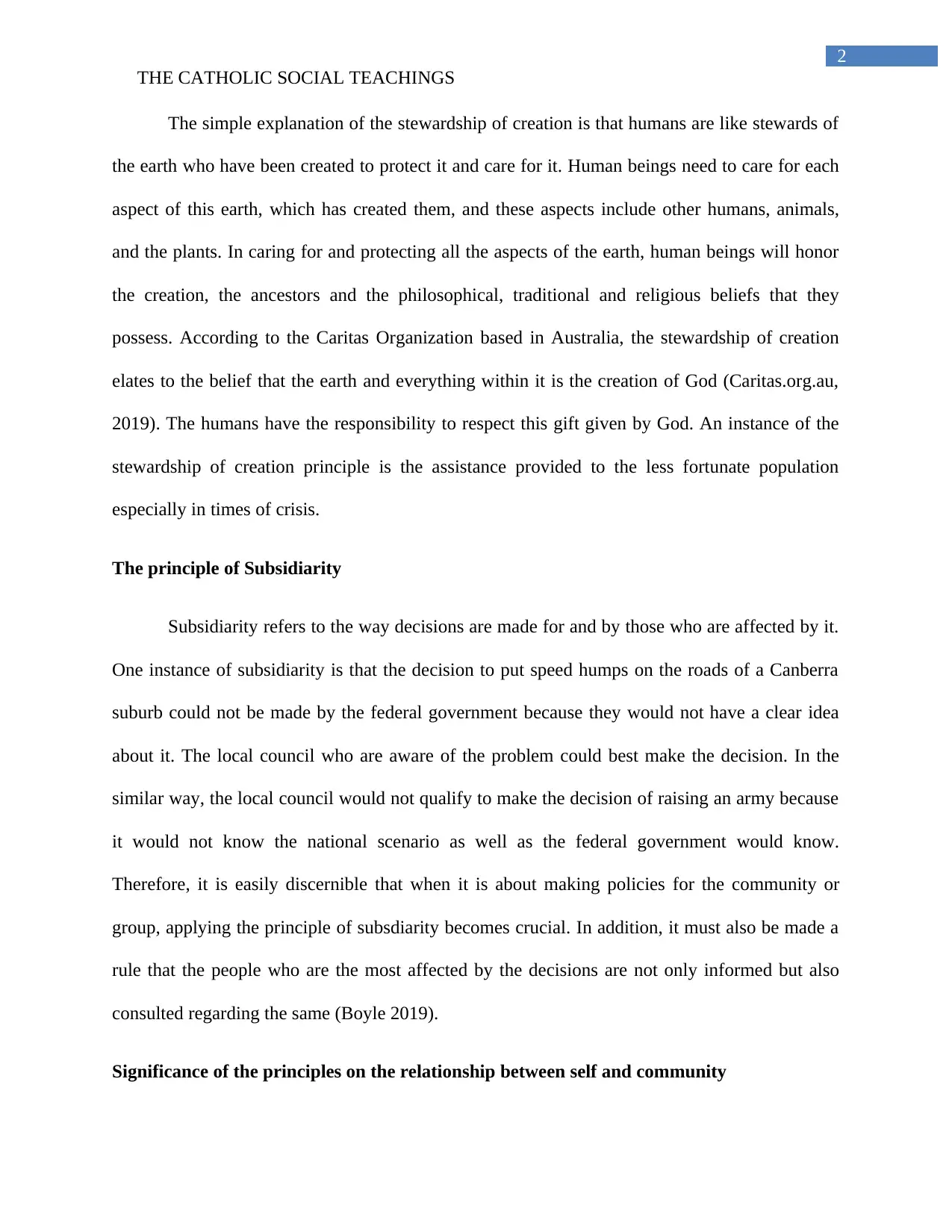
2
THE CATHOLIC SOCIAL TEACHINGS
The simple explanation of the stewardship of creation is that humans are like stewards of
the earth who have been created to protect it and care for it. Human beings need to care for each
aspect of this earth, which has created them, and these aspects include other humans, animals,
and the plants. In caring for and protecting all the aspects of the earth, human beings will honor
the creation, the ancestors and the philosophical, traditional and religious beliefs that they
possess. According to the Caritas Organization based in Australia, the stewardship of creation
elates to the belief that the earth and everything within it is the creation of God (Caritas.org.au,
2019). The humans have the responsibility to respect this gift given by God. An instance of the
stewardship of creation principle is the assistance provided to the less fortunate population
especially in times of crisis.
The principle of Subsidiarity
Subsidiarity refers to the way decisions are made for and by those who are affected by it.
One instance of subsidiarity is that the decision to put speed humps on the roads of a Canberra
suburb could not be made by the federal government because they would not have a clear idea
about it. The local council who are aware of the problem could best make the decision. In the
similar way, the local council would not qualify to make the decision of raising an army because
it would not know the national scenario as well as the federal government would know.
Therefore, it is easily discernible that when it is about making policies for the community or
group, applying the principle of subsdiarity becomes crucial. In addition, it must also be made a
rule that the people who are the most affected by the decisions are not only informed but also
consulted regarding the same (Boyle 2019).
Significance of the principles on the relationship between self and community
THE CATHOLIC SOCIAL TEACHINGS
The simple explanation of the stewardship of creation is that humans are like stewards of
the earth who have been created to protect it and care for it. Human beings need to care for each
aspect of this earth, which has created them, and these aspects include other humans, animals,
and the plants. In caring for and protecting all the aspects of the earth, human beings will honor
the creation, the ancestors and the philosophical, traditional and religious beliefs that they
possess. According to the Caritas Organization based in Australia, the stewardship of creation
elates to the belief that the earth and everything within it is the creation of God (Caritas.org.au,
2019). The humans have the responsibility to respect this gift given by God. An instance of the
stewardship of creation principle is the assistance provided to the less fortunate population
especially in times of crisis.
The principle of Subsidiarity
Subsidiarity refers to the way decisions are made for and by those who are affected by it.
One instance of subsidiarity is that the decision to put speed humps on the roads of a Canberra
suburb could not be made by the federal government because they would not have a clear idea
about it. The local council who are aware of the problem could best make the decision. In the
similar way, the local council would not qualify to make the decision of raising an army because
it would not know the national scenario as well as the federal government would know.
Therefore, it is easily discernible that when it is about making policies for the community or
group, applying the principle of subsdiarity becomes crucial. In addition, it must also be made a
rule that the people who are the most affected by the decisions are not only informed but also
consulted regarding the same (Boyle 2019).
Significance of the principles on the relationship between self and community
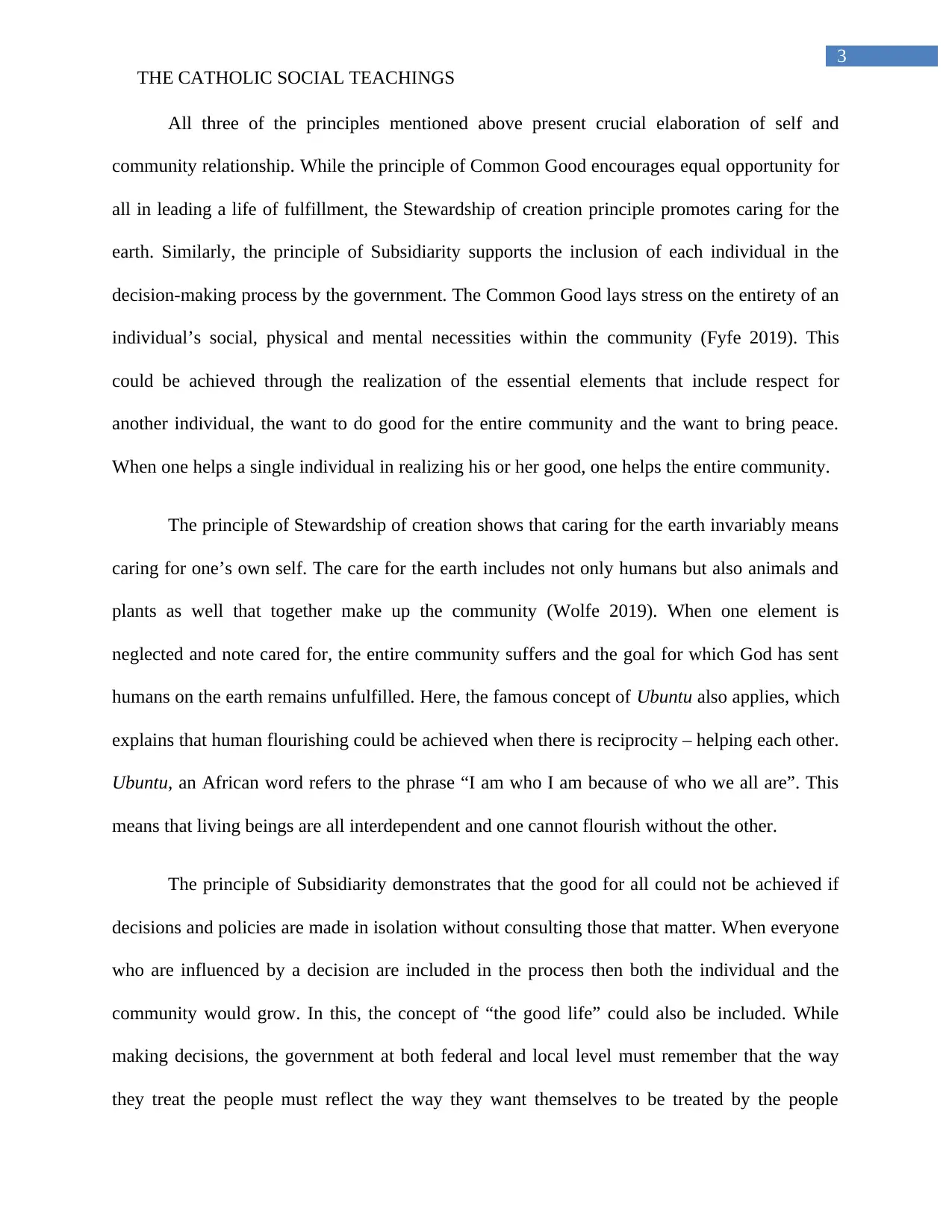
3
THE CATHOLIC SOCIAL TEACHINGS
All three of the principles mentioned above present crucial elaboration of self and
community relationship. While the principle of Common Good encourages equal opportunity for
all in leading a life of fulfillment, the Stewardship of creation principle promotes caring for the
earth. Similarly, the principle of Subsidiarity supports the inclusion of each individual in the
decision-making process by the government. The Common Good lays stress on the entirety of an
individual’s social, physical and mental necessities within the community (Fyfe 2019). This
could be achieved through the realization of the essential elements that include respect for
another individual, the want to do good for the entire community and the want to bring peace.
When one helps a single individual in realizing his or her good, one helps the entire community.
The principle of Stewardship of creation shows that caring for the earth invariably means
caring for one’s own self. The care for the earth includes not only humans but also animals and
plants as well that together make up the community (Wolfe 2019). When one element is
neglected and note cared for, the entire community suffers and the goal for which God has sent
humans on the earth remains unfulfilled. Here, the famous concept of Ubuntu also applies, which
explains that human flourishing could be achieved when there is reciprocity – helping each other.
Ubuntu, an African word refers to the phrase “I am who I am because of who we all are”. This
means that living beings are all interdependent and one cannot flourish without the other.
The principle of Subsidiarity demonstrates that the good for all could not be achieved if
decisions and policies are made in isolation without consulting those that matter. When everyone
who are influenced by a decision are included in the process then both the individual and the
community would grow. In this, the concept of “the good life” could also be included. While
making decisions, the government at both federal and local level must remember that the way
they treat the people must reflect the way they want themselves to be treated by the people
THE CATHOLIC SOCIAL TEACHINGS
All three of the principles mentioned above present crucial elaboration of self and
community relationship. While the principle of Common Good encourages equal opportunity for
all in leading a life of fulfillment, the Stewardship of creation principle promotes caring for the
earth. Similarly, the principle of Subsidiarity supports the inclusion of each individual in the
decision-making process by the government. The Common Good lays stress on the entirety of an
individual’s social, physical and mental necessities within the community (Fyfe 2019). This
could be achieved through the realization of the essential elements that include respect for
another individual, the want to do good for the entire community and the want to bring peace.
When one helps a single individual in realizing his or her good, one helps the entire community.
The principle of Stewardship of creation shows that caring for the earth invariably means
caring for one’s own self. The care for the earth includes not only humans but also animals and
plants as well that together make up the community (Wolfe 2019). When one element is
neglected and note cared for, the entire community suffers and the goal for which God has sent
humans on the earth remains unfulfilled. Here, the famous concept of Ubuntu also applies, which
explains that human flourishing could be achieved when there is reciprocity – helping each other.
Ubuntu, an African word refers to the phrase “I am who I am because of who we all are”. This
means that living beings are all interdependent and one cannot flourish without the other.
The principle of Subsidiarity demonstrates that the good for all could not be achieved if
decisions and policies are made in isolation without consulting those that matter. When everyone
who are influenced by a decision are included in the process then both the individual and the
community would grow. In this, the concept of “the good life” could also be included. While
making decisions, the government at both federal and local level must remember that the way
they treat the people must reflect the way they want themselves to be treated by the people
Secure Best Marks with AI Grader
Need help grading? Try our AI Grader for instant feedback on your assignments.
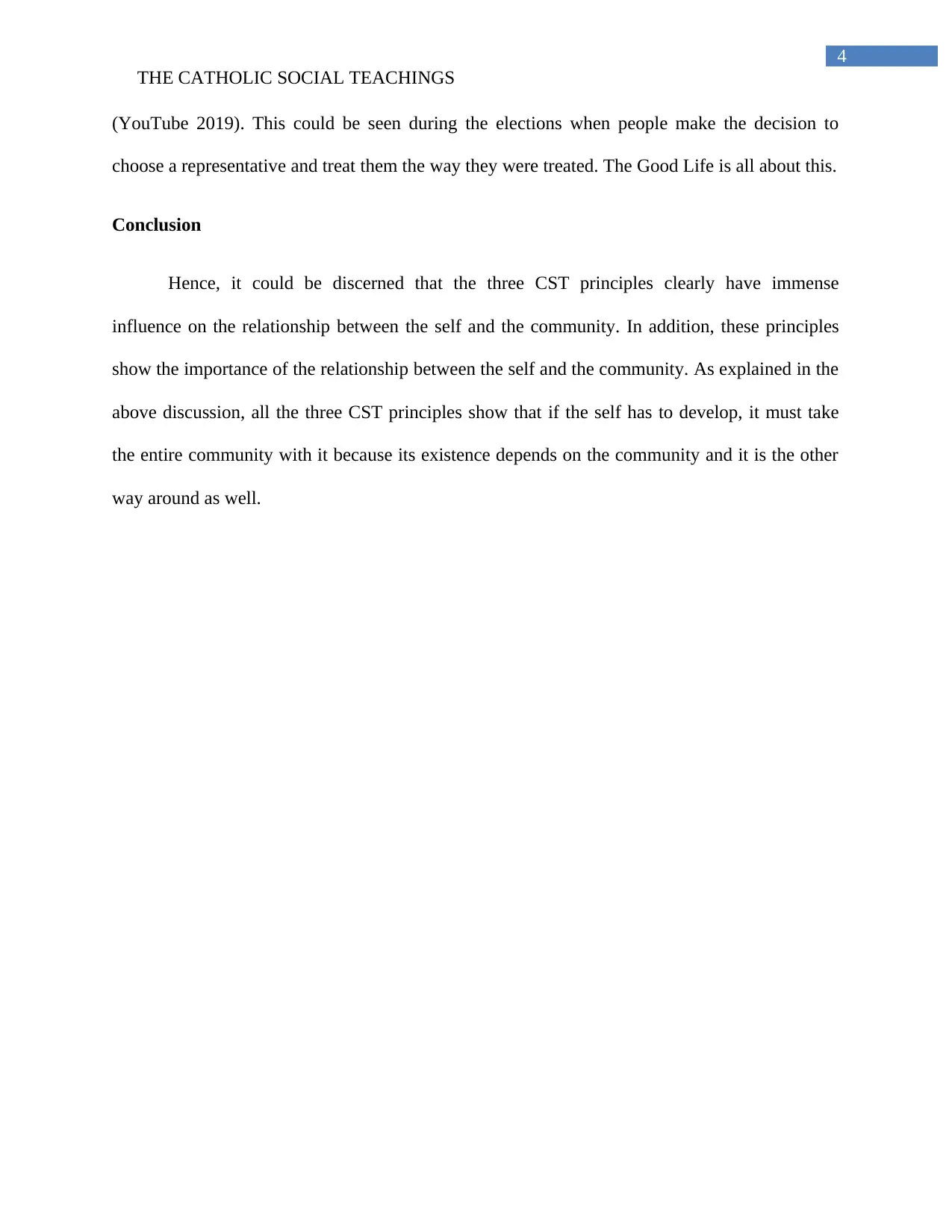
4
THE CATHOLIC SOCIAL TEACHINGS
(YouTube 2019). This could be seen during the elections when people make the decision to
choose a representative and treat them the way they were treated. The Good Life is all about this.
Conclusion
Hence, it could be discerned that the three CST principles clearly have immense
influence on the relationship between the self and the community. In addition, these principles
show the importance of the relationship between the self and the community. As explained in the
above discussion, all the three CST principles show that if the self has to develop, it must take
the entire community with it because its existence depends on the community and it is the other
way around as well.
THE CATHOLIC SOCIAL TEACHINGS
(YouTube 2019). This could be seen during the elections when people make the decision to
choose a representative and treat them the way they were treated. The Good Life is all about this.
Conclusion
Hence, it could be discerned that the three CST principles clearly have immense
influence on the relationship between the self and the community. In addition, these principles
show the importance of the relationship between the self and the community. As explained in the
above discussion, all the three CST principles show that if the self has to develop, it must take
the entire community with it because its existence depends on the community and it is the other
way around as well.
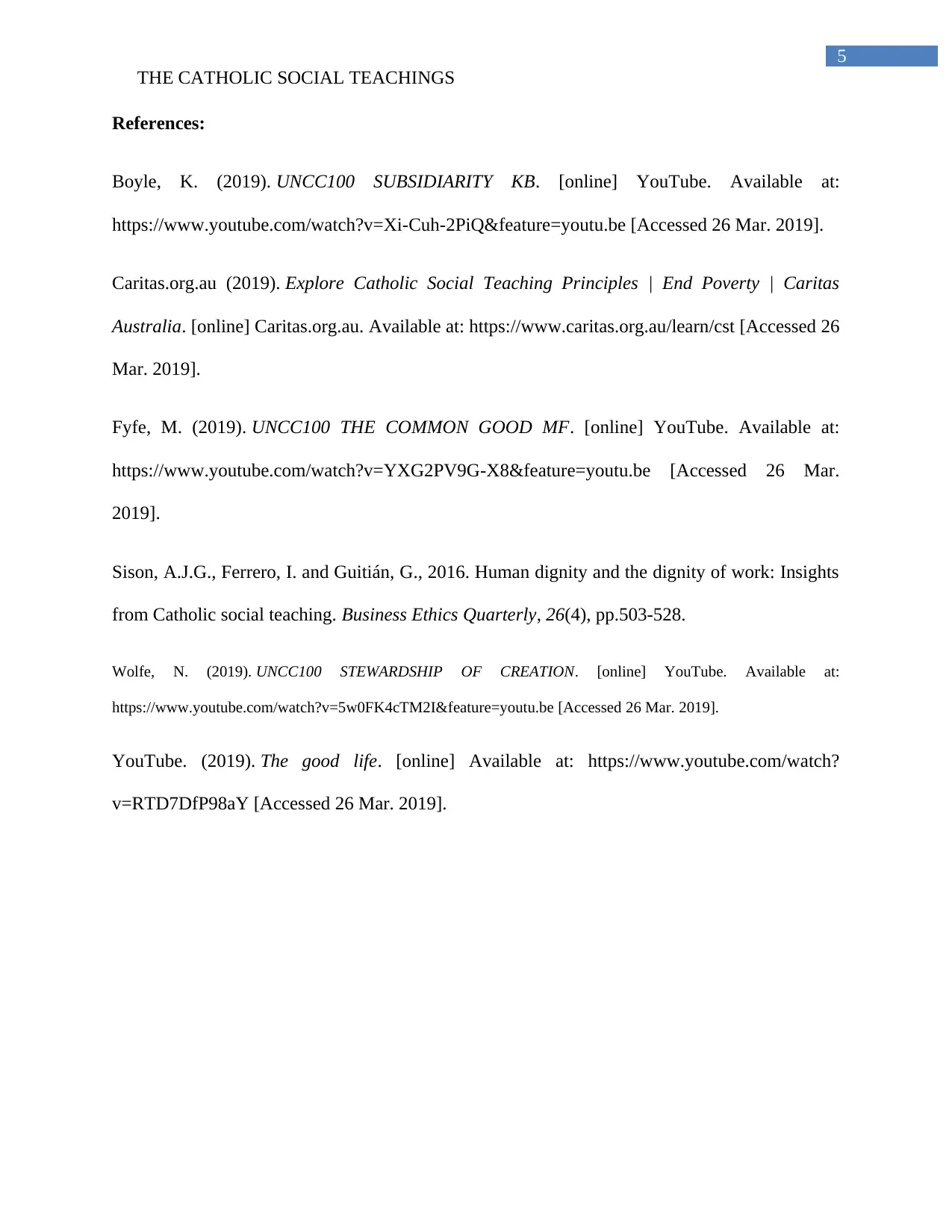
5
THE CATHOLIC SOCIAL TEACHINGS
References:
Boyle, K. (2019). UNCC100 SUBSIDIARITY KB. [online] YouTube. Available at:
https://www.youtube.com/watch?v=Xi-Cuh-2PiQ&feature=youtu.be [Accessed 26 Mar. 2019].
Caritas.org.au (2019). Explore Catholic Social Teaching Principles | End Poverty | Caritas
Australia. [online] Caritas.org.au. Available at: https://www.caritas.org.au/learn/cst [Accessed 26
Mar. 2019].
Fyfe, M. (2019). UNCC100 THE COMMON GOOD MF. [online] YouTube. Available at:
https://www.youtube.com/watch?v=YXG2PV9G-X8&feature=youtu.be [Accessed 26 Mar.
2019].
Sison, A.J.G., Ferrero, I. and Guitián, G., 2016. Human dignity and the dignity of work: Insights
from Catholic social teaching. Business Ethics Quarterly, 26(4), pp.503-528.
Wolfe, N. (2019). UNCC100 STEWARDSHIP OF CREATION. [online] YouTube. Available at:
https://www.youtube.com/watch?v=5w0FK4cTM2I&feature=youtu.be [Accessed 26 Mar. 2019].
YouTube. (2019). The good life. [online] Available at: https://www.youtube.com/watch?
v=RTD7DfP98aY [Accessed 26 Mar. 2019].
THE CATHOLIC SOCIAL TEACHINGS
References:
Boyle, K. (2019). UNCC100 SUBSIDIARITY KB. [online] YouTube. Available at:
https://www.youtube.com/watch?v=Xi-Cuh-2PiQ&feature=youtu.be [Accessed 26 Mar. 2019].
Caritas.org.au (2019). Explore Catholic Social Teaching Principles | End Poverty | Caritas
Australia. [online] Caritas.org.au. Available at: https://www.caritas.org.au/learn/cst [Accessed 26
Mar. 2019].
Fyfe, M. (2019). UNCC100 THE COMMON GOOD MF. [online] YouTube. Available at:
https://www.youtube.com/watch?v=YXG2PV9G-X8&feature=youtu.be [Accessed 26 Mar.
2019].
Sison, A.J.G., Ferrero, I. and Guitián, G., 2016. Human dignity and the dignity of work: Insights
from Catholic social teaching. Business Ethics Quarterly, 26(4), pp.503-528.
Wolfe, N. (2019). UNCC100 STEWARDSHIP OF CREATION. [online] YouTube. Available at:
https://www.youtube.com/watch?v=5w0FK4cTM2I&feature=youtu.be [Accessed 26 Mar. 2019].
YouTube. (2019). The good life. [online] Available at: https://www.youtube.com/watch?
v=RTD7DfP98aY [Accessed 26 Mar. 2019].
1 out of 6
Related Documents
Your All-in-One AI-Powered Toolkit for Academic Success.
+13062052269
info@desklib.com
Available 24*7 on WhatsApp / Email
![[object Object]](/_next/static/media/star-bottom.7253800d.svg)
Unlock your academic potential
© 2024 | Zucol Services PVT LTD | All rights reserved.



